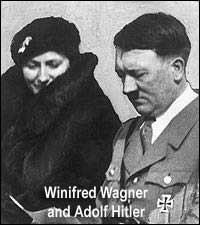
Music, Evil, and the Wagner Dynasty
I've recently finished reading Jonathan Carr's "The Wagner Clan", an absorbing, clear-sighted and amazingly cant-free history of Richard Wagner and his descendants — a family which, for better or worse, continues to attract attention, controversy, and headlines.
Wagner himself has toppled from the olympian position he held in the late nineteenth century; looking back from the present I find it a bit difficult to understand the mania surrounding the man and his work. Perhaps that's due to my never having been a Wagnerite; I certainly admire the Wagner operas but I consider them part of the overall tapestry of the late Romantic.
My own vote for the outstanding opera composer of the era goes to Verdi, in fact. So in my eyes Wagner adulation seems cultish, faddish, and faintly ridiculous, even in its considerably watered-down modern form, much less the frenzied veneration of a century past.
Then we have the entire issue of anti-Semitism, rabid German nationalism, Hitler, and the Nazis. Neptune's ocean cannot wash that stain off the family's collective hand; it remains dark, ineradicable, and deeply troubling.
Richard Wagner himself was weirdly inconsistent about his anti-Semitism, but then again he was weirdly inconsistent about almost everything. Ranting egregiously in print, he nonetheless maintained a close circle of Jewish friends and colleagues.
Among the most strident of the clan were those who married into it. First on the list is Wagner's second wife Cosima, daughter of Franz Liszt, intractable, unyielding, obstinate, frighteningly consistent in her uncompromising vilification.
Then came honey-tongued, foul-minded Houston Stewart Chamberlain, who married Cosima and Richard's daughter Eva, and whose writings provided verbal ammunition for the nascent Nazi movement.
 The familial black sheep par excellence was Winifred Williams Klindworth Wagner, English-born wife of Wagner's bisexual son Siegfried, who cultivated a close friendship with "Uncle Wolf" (that's Adolf Hitler to the rest of us), and helped to create in Bayreuth a nexus for the Third Reich. Subsequent documents have revealed that she might have been much less sympathetic to Nazi goals than has been typically portrayed, but a substantial store of documents concerning Winifred yet remain sequestered by the family. Revelations may well be forthcoming...someday.
The familial black sheep par excellence was Winifred Williams Klindworth Wagner, English-born wife of Wagner's bisexual son Siegfried, who cultivated a close friendship with "Uncle Wolf" (that's Adolf Hitler to the rest of us), and helped to create in Bayreuth a nexus for the Third Reich. Subsequent documents have revealed that she might have been much less sympathetic to Nazi goals than has been typically portrayed, but a substantial store of documents concerning Winifred yet remain sequestered by the family. Revelations may well be forthcoming...someday.
Carr's book promises fascinating reading to anyone who has pondered the question of Richard Wagner and the Nazis, or wondered about the strange lock the family still continues to hold over the old Festspielhaus in Bayreuth and the summer festival devoted to Wagner's operas.
Or questioned, for that matter, why there yet remains even any trace of the old Wagner mythos. He was, after all, an opera composer, just like Bellini or Donizetti or Rossini or Verdi or Puccini or Leoncavallo or Bizet or Mascagni.
But none of those other fellows left a squabbling dynasty behind; Richard Wagner did.
Jonathan Carr's "The Wagner Clan" has elicited a number of very perceptive reviews, easily available online.
- The Telegraph offers two excellent articles, one by Jonathan Keates, and the other by Ivan Hewett.
- Laura Miller's superbly-written essay on the Wagners as viewed from Carr's lens can be found on Salon. (Towards the end of the article, she begins to refer to Carr as "Carroll" for some odd reason.)
- Fine, solid articles can be found from the New York Times, the London Times, and The Independent.

Carr: The Wagner Clan
Jonathan Carr, "The Wagner Clan"
ISBN 0871139758
Publisher: Atlantic Monthly Press (December 21, 2007)
Paperback edition will be published by Grove Press in January 2009.
